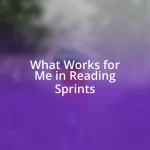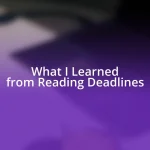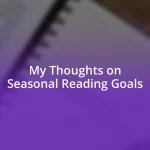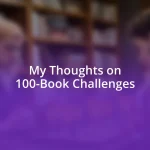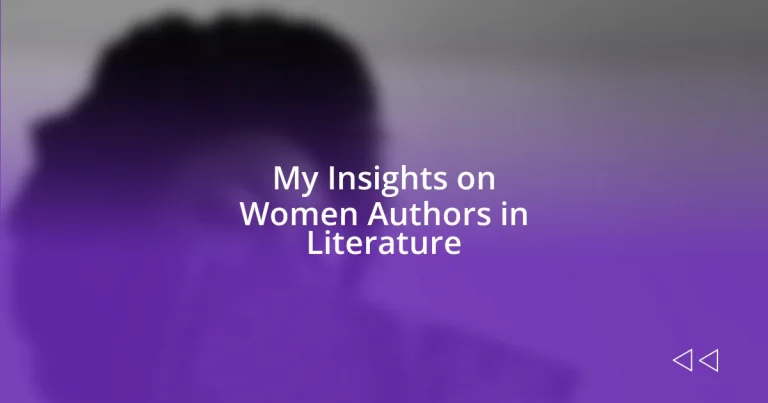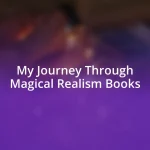Key takeaways:
- Women authors have significantly shaped literature by offering diverse perspectives, challenging societal norms, and fostering community and empathy.
- Historical contributions include notable figures like Virginia Woolf, Toni Morrison, and Mary Shelley, who expanded literary boundaries and highlighted marginalized voices.
- Contemporary authors like Chimamanda Ngozi Adichie and Sally Rooney address themes of identity and everyday life, while challenges such as societal expectations and financial barriers persist for women writers.
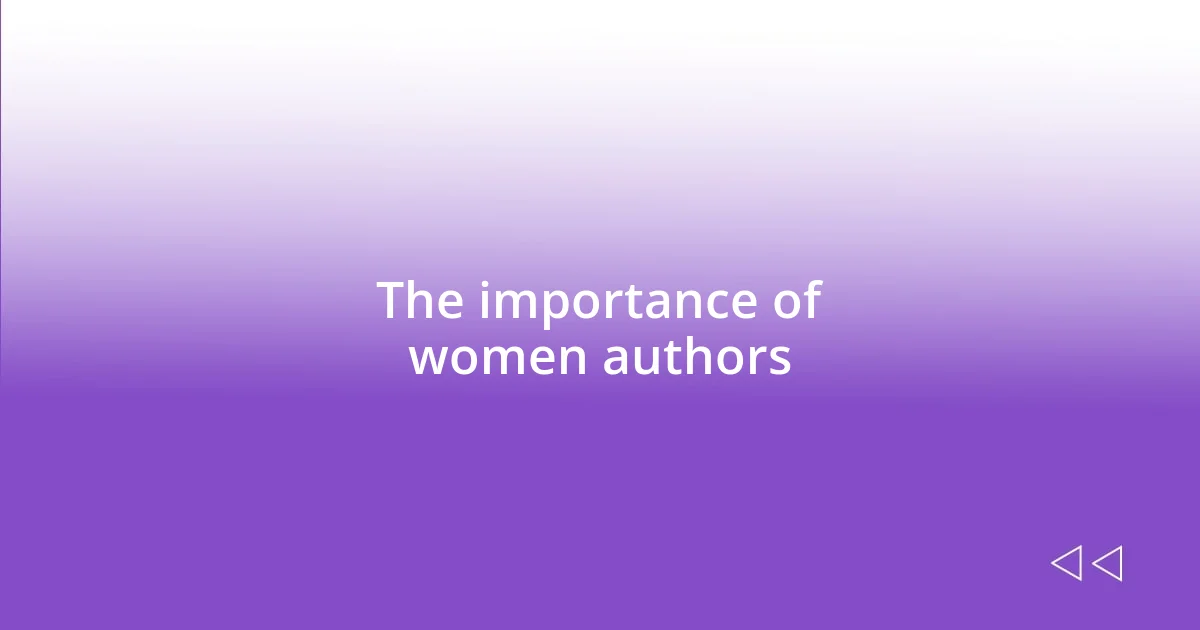
The importance of women authors
Women authors have played a crucial role in shaping literature, offering perspectives that are often overlooked. I remember the first time I read a book by Virginia Woolf; it was as if a hidden world unfolded before me. It led me to wonder, how many voices have we missed throughout history simply because they were excluded from the literary conversation?
Their contributions extend far beyond storytelling; they often challenge societal norms and inspire change. For instance, reading Toni Morrison made me reflect on the complexities of identity and the power of resilience. Isn’t it fascinating how one author can invite us to reconsider our perspectives and push for deeper understanding?
Moreover, women authors have created invaluable spaces for marginalized voices. Through their work, they foster community and evoke empathy, making literature a platform for social justice. I’ve found that engaging with diverse narratives not only broadens my worldview but also builds connections with others—doesn’t that enhance our collective human experience?
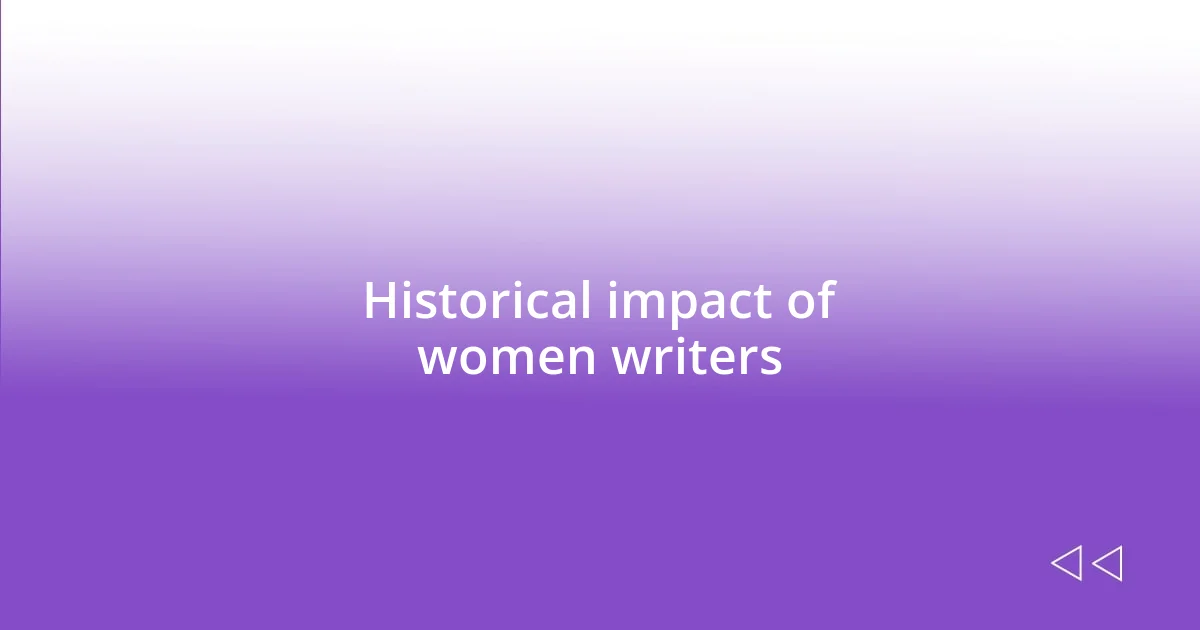
Historical impact of women writers
Throughout history, women writers have paved the way for change, often defying societal constraints placed upon them. When I first delved into the works of authors like the Brontë sisters, I was struck by their audacity to explore themes of love, ambition, and societal expectations at a time when women’s voices were largely silenced. Their narratives didn’t just tell stories; they sparked dialogues about the roles of women and inspired generations to seek their own voices, igniting a ripple effect of empowerment.
- The works of Mary Shelley challenged traditional notions of gender and created new paradigms in science fiction.
- Zora Neale Hurston brought the African American experience to the forefront of literature, enriching the narrative landscape.
- Jane Austen’s keen observations on social class and gender dynamics continue to resonate in discussions about feminism today.
- Writers like Virginia Woolf influenced literary modernism, pushing boundaries on narrative form and perspective.
- Contemporary authors such as Chimamanda Ngozi Adichie advocate for feminism and address cultural identity, influencing a global conversation.
Seeing these women break barriers inspires me to appreciate the profound impact literature has on our understanding of ourselves and society. It’s as if each story they penned pulled the threads of a larger tapestry, weaving in experiences that should never have been forgotten.
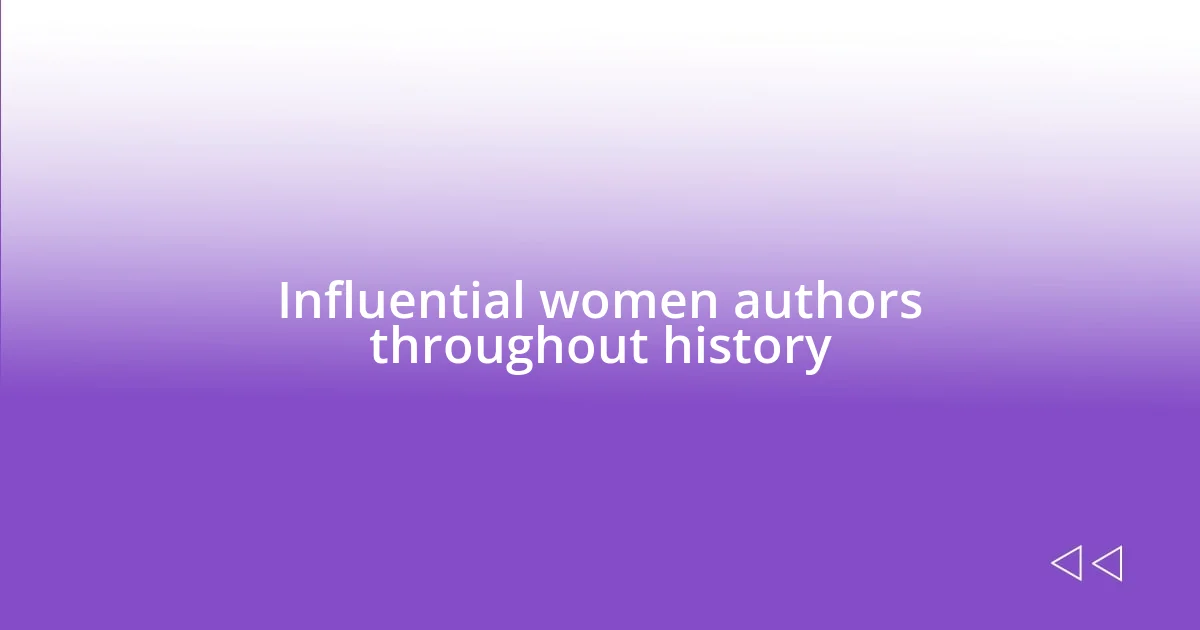
Influential women authors throughout history
The contributions of women authors throughout history are often understated yet monumental. For instance, reading works by Emily Dickinson not only opened my eyes to the beauty of brevity in poetry but also her ability to encapsulate deep emotions in a few words. Dickinson’s reclusive nature contrasted sharply with the enormity of her impact, making me question how many other brilliant voices remain unheard due to societal constraints.
I also reflect on the trailblazing efforts of women like Toni Morrison, whose rich narratives invited me into the complexities of African American experiences. Her ability to tackle painful histories while celebrating the triumph of the human spirit resonates deeply with me. I often find myself pondering how such profound insights can stem from personal experiences, a reminder of the power storytelling holds in bridging divides.
Moreover, I can’t help but admire the boldness of women like J.K. Rowling, who, despite facing rejection, transformed the literary landscape with her Harry Potter series. Her journey speaks to resilience; it reminds me that every author’s voice, no matter how small, can change the world. The ripple effects of their stories have a way of sparking movements and inspiring generations, making me grateful for the narratives that persist in shaping our culture and conscience.
| Author | Notable Contributions |
|---|---|
| Virginia Woolf | Influenced modernism and feminist thought. |
| Mary Shelley | Challenged gender norms in science fiction. |
| Toni Morrison | Highlighted African American voices and experiences. |
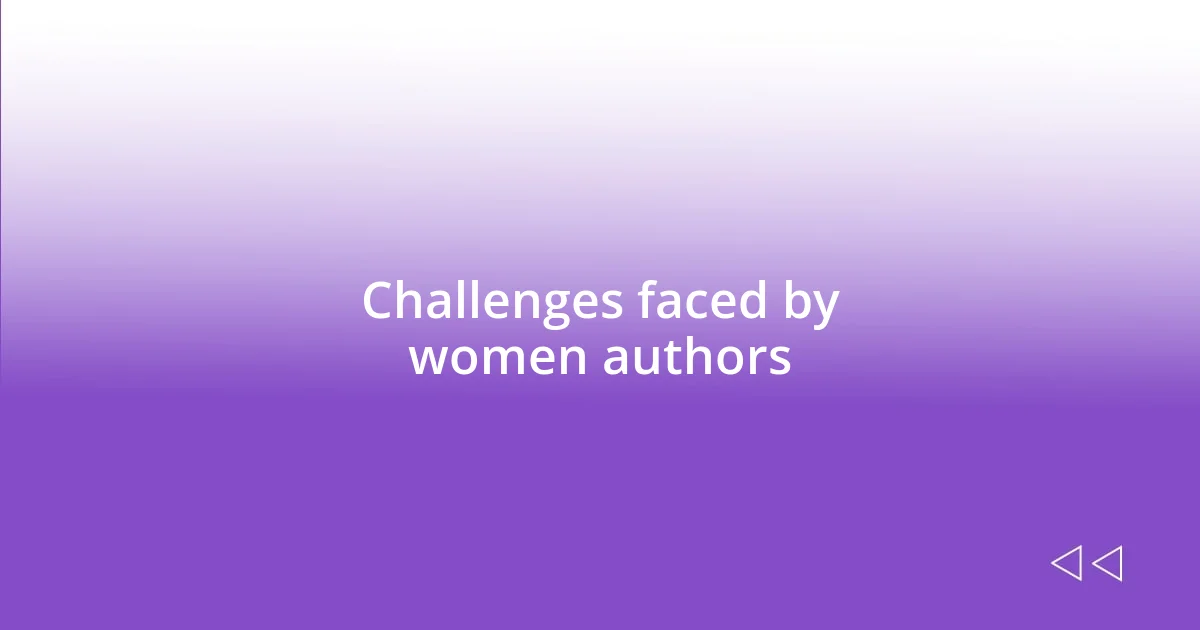
Challenges faced by women authors
The journey of women authors has often been riddled with challenges that seem daunting. For many, the struggle to gain recognition in a male-dominated literary world begins with self-doubt and lack of support. I remember reading about how Zora Neale Hurston faced criticism and rejection, which makes me wonder how many vibrant voices fade away due to similar circumstances. It’s heartbreaking to think about the countless untold stories simply because society couldn’t see their worth.
Moreover, societal expectations often create a double bind for women writers. When I first came across the term “motherhood penalty,” it struck a chord with me. This idea that women are often judged harshly for balancing family life with their writing careers highlights a persistent bias. It’s frustrating to see talented authors like J.K. Rowling facing scrutiny not just for their work, but for their personal lives. How can we expect creativity to flourish in such an environment?
Lastly, the financial barriers present yet another challenge. I remember feeling inspired by lesser-known authors who paved the way through sheer determination, yet it’s daunting to consider how often financial limitations prevent women from pursuing their literary passions. The question lingers: how many stories have been lost simply because women couldn’t afford to write them? It’s a stark reminder of the resilience needed to overcome these barriers, and I often find myself reflecting on how essential it is to support emerging voices in literature.
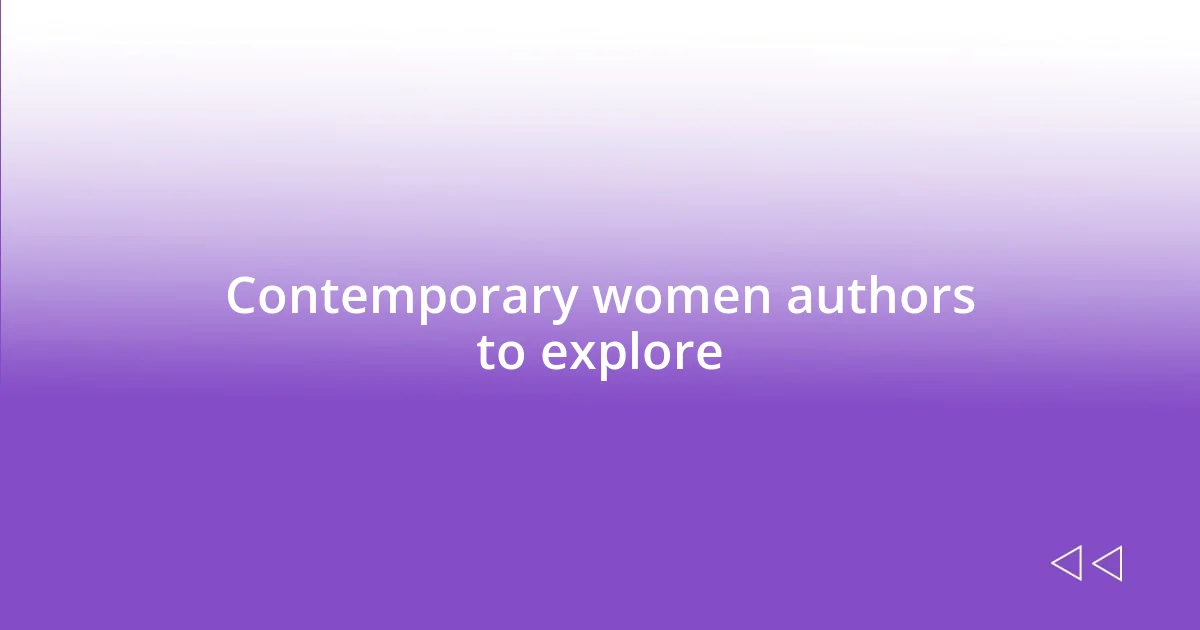
Contemporary women authors to explore
Contemporary women authors are making waves that I believe everyone should dive into. One name that stands out is Chimamanda Ngozi Adichie, whose compelling narratives allow me to see the intricate tapestry of Nigeria’s history alongside universal themes of identity and belonging. Every time I read her work, I find myself contemplating the intersection of culture and feminism, leaving me eager to share her stories with others.
Another author I’m fond of is Celeste Ng. Her novels, particularly “Little Fires Everywhere,” have a way of peeling back the layers of suburban life, revealing the complexities of motherhood and race. I often get drawn into her depiction of family dynamics, which resonate with my own experiences. Have you ever read a book that made you rethink your relationship with your own upbringing? Ng’s storytelling prompts us to explore how the environments we grow up in shape who we are.
Then there’s Sally Rooney, whose sharp, witty prose I can’t seem to get enough of. Her books reflect the nuances of millennial life, making me feel seen in this chaotic world. Each dialogue feels like a conversation among friends, and I find myself smiling at the relatable moments that speak to my own friendships. Let’s be honest—how refreshing is it to read a narrative that captures the awkward beauty of our everyday interactions? Rooney’s work reminds me of the power of connection in literature and how it echoes in our lives.
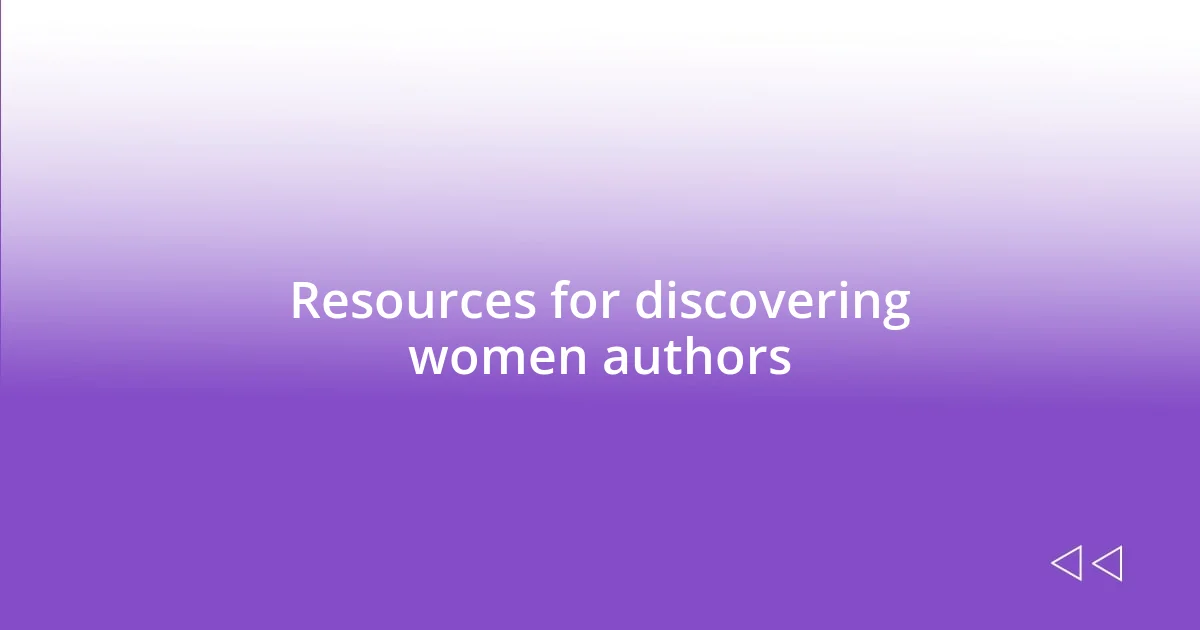
Resources for discovering women authors
Finding resources to discover women authors can be an enriching journey. I often turn to online platforms like Goodreads, where curated lists of female authors are readily available. Just the other day, I stumbled upon a list titled “Must-Read Women Writers,” and it introduced me to some incredible voices I had overlooked. Have you ever had that exhilarating moment when you discover an author whose work resonates with you on a personal level? It’s a reminder of how diverse literature can be.
Another resource that has truly inspired me is the Women’s Prize for Fiction. This prestigious award shines a spotlight on outstanding books written by women, and I find it helpful in guiding my reading choices. When I came across the winner’s list, it felt like opening a treasure chest, filled with stories waiting to be explored. It’s fascinating how this award has consistently brought attention to authors who might otherwise remain in the shadows, don’t you think?
Bookstore displays dedicated to women authors can also be delightful to explore. I vividly remember wandering into my local bookstore and being drawn to a section that highlighted female storytellers. Flipping through titles from authors like Toni Morrison and Alice Walker not only enriched my understanding but also left me feeling empowered. Those moments often spark questions—what stories might be hiding in lesser-known titles? I encourage you to take the time to seek out these specific spaces; you never know what literary gems you might uncover!
